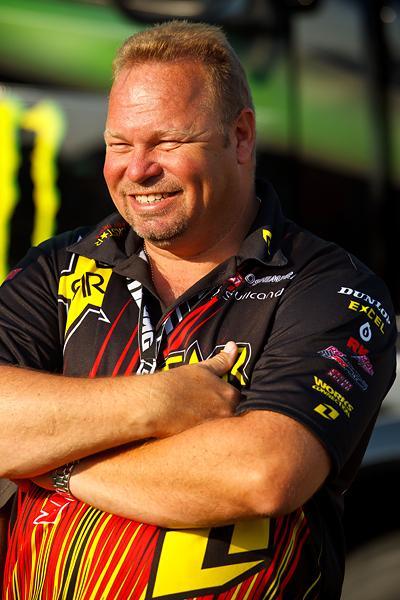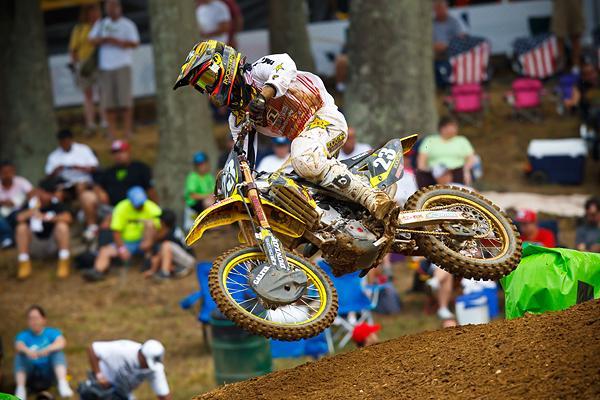At the helm of each team in Lucas Oil AMA Pro Motocross sits the team manager. What do they do? How do they prepare their team for battle? The Rockstar Suzuki team recently hired industry veteran Dave Gowland as Team Manager. We chatted with him at Budds Creek to find out what a Team Manager actually does.
Racer X: Dave, you’ve been team manager here for a month. What does a team manager do? Do you know yet?
Dave Gowland: [Laughs] We do a lot of things! We obviously have sponsor obligations and commitments, rider contracts, we need to look at replacement riders for injured riders, and also future riders so we can plan our strategy for the future. That’s a big part of it, a large overview, dealing with sponsors and riders. The other part is logistics. We need to get the team members from race to race, we need to have enough parts so we can build the bikes and enough time built into the travel to do it. We want everyone to travel seamlessly so we don’t end up with cancelled flights or extra hotel rooms. We need to make sure everyone gets paid on time because they have their own lives they have to live. So that’s a real challenge, doing all of that.
Are you literally the travel agent?
I’m not actually the travel agent, but I’m the one who decides where we are going, when we are going, where are we going to do when we get there, how are we going to get there, and what we’re going to go in. Should we take a few cars or a van? And once we get there we need to be sure that all the reservations are set and everything is paid for. A lot of logistical stuff, beyond travel, too. Make sure the sponsors have their stuff ready. Make sure the riders have the right jerseys with the right logos. Be ready for a photo shoot. Have everything ready for AMA tech inspection, make sure the bikes meet sound test, make sure we have enough parts on the truck to get to the next event.

Gowland does it all on race weekends, and always accompanied with a big smile.
Photo: Simon Cudby
You just named a lot of things, and none of them have anything to do with what actually goes on during a moto. There’s so much that goes on just to get the team, mechanics, bikes and riders to the track before they even get to race.
Yeah. And once the gate drops, you have to make sure you’re looking at the lap times, you look at the lines, you take off that management hat and put on the coach’s hat. All of a sudden you’re a physiologist and a motivator, and when your guys are down, you try to pick them up, and when they’re up, you try to get them to stay up so they can get the results that we need. Unfortunately, this year we aren’t quite were we need to be, but we’re working on it every week so we can get our guys up the leader board.
You used to be a mechanic. How involved are you on the technical end?
That’s left to other people. I have Rene Zappa who handles that. I’ll give it an overview, I’ll look at the dyno charts when I can, but Rene basically looks after our relationship with Suzuki and making sure we’re getting the parts from them. If there are areas where I need to get some new parts to come in, or get someone to give us something different, that’s where my duties come into play. But Rene pretty much looks after the bikes.
There’s so much to do—the logistics like you said, but also the bikes, the riders and their training, their motivation, all of these parts. How hard is it to resist trying to jump in on all of these fronts and trying to do it all, and then realizing, you want to help, but you can’t do it all.
Well, it comes down to realizing there are things that you can and you can’t do. You need to prioritize, and after that, you have to delegate. That’s part of being a manager, you have to delegate and make sure you can trust the decisions that those people are going to make. Once we get the direction as a team down, everything should fall into place.
Give me your schedule between High Point and Budds Creek.
We actually did a bike build on Sunday; we stayed after High Point and worked in the hotel parking lot. We basically “canned” our bikes at the track, which is take them completely apart. The next morning, Sunday, we were up at 6 a.m. to rebuild the bikes. We worked on them until 3:30 p.m., then we headed to Pittsburgh airport to catch a flight, we got into Orange County on the last flight in, about 10:45. By the time the day was over, we had been up almost 24 hours. And we went to the shop at noon on Monday, started working there. We rode at Comp Edge on Tuesday, had some meetings on Wednesday, and on Thursday I flew here.
And then the work begins again.
Yes, the bikes aren’t completely done when we get here, even after the build last Sunday. There are little things we need to change, depending on the weather and track conditions, for example. And we did some suspension testing during the week, so we needed to bring some new suspension with us and swap out all the old stuff. There are still a lot of things that need to be done before tech inspection. Then we roll through and we’re racing.
Seven days a week.
It is right now, yeah. This four-week stretch of races is really tough.
Do you see it on the faces of your crew, sometimes? The grind?
I think so, and I think we need to have good team camaraderie. We all need to get along and realize we have other commitments in life at times, too, and help each other out, but at the same time, there’s a job to be done. Yeah it’s tough living on the road like this, but that’s why we got into this sport. Because we love it.





